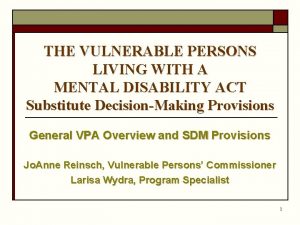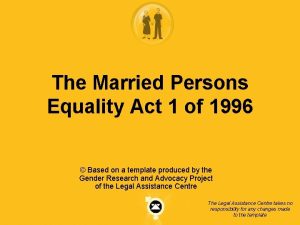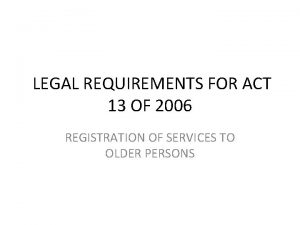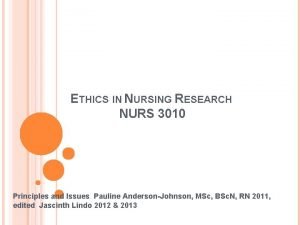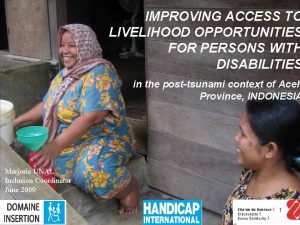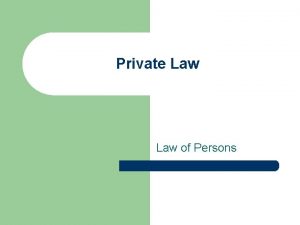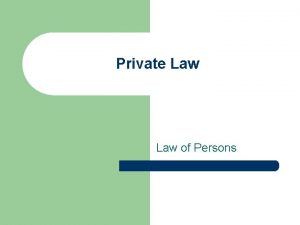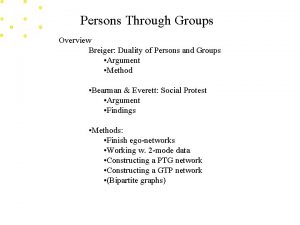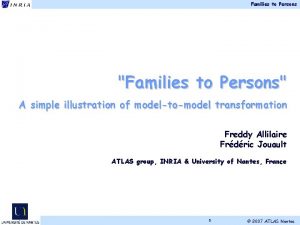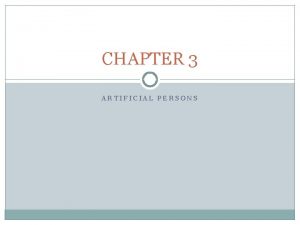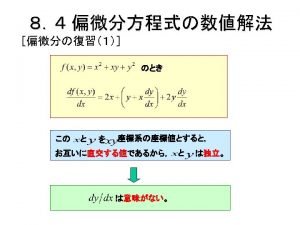Private Law of Persons Private Law l l























- Slides: 23

Private Law of Persons

Private Law l l regulates relations between individuals as private persons and all the parties within this law are considered equal to each other-----at least legally. Branches of private law: – – – Civil law----including law of persons + family law + law of succession + law of property + law of obligations. Commercial law Private international law

Private Law l Two important principles of the Private Law: – – l l Principle of equality of the parties Voluntary agreement of the parties Principle of equality: Despite inequalities in the real life-----all persons are equal in private law – – Remember public law----administration is always superior to the individual. In private law----no party can impose obligations or duties unilaterally over the other parties (individuals) unless they give their consent.

Private Law l l l Voluntary agreement: Every legal transaction in private law must be based on the voluntary agreement---voluntary expression of consent of the parties. Even the state-----in its relations with private persons which falls in the scope of private law-----is not in a superior position – – a rent relationship between the state and a tenant----if tenant does not comply with his contractual undertakings----than state cannot punish or directly use force against that individual can only bring an action before a court against the tenant and tries to obtain a positive decision from the court

LAW OF PERSONS l Persons: – a- Human beings (real persons/natural persons) b- legal persons---societies/corporations etc. l l – i- Public Legal Persons ii- Private legal persons. All persons whether real or legal----have rights and obligations----but the extent of these rights is not same.

LAW OF PERSONS l Begining of Personality: – – “personality” starts at the moment of birth----BUT---even an unborn child may have a degree of personality. A child may be subject of rights after he/she is conceived (picturedenvisaged)-----provided that he is subsequently born alive. l l In the law of inheritance may be a “legal heir” End of Personality: – – Personality ends at death dead person cannot be subject of rights but in case of a will this will become effective and applied at his/her death. a person may be declared dead by Court if he has been lost in an accident or ship collision------or if he is a missing person and a certain period of time has lapsed.

Persons as Subjects of Right and Capacity of Person l “Ability to be the subject of rights” is different from the “capacity to act”. – l all individuals are equal without any discrimination before the law But despite this general principle there are some differences; – – l Even unborn child is the subject of rights---but his/her capacity to act legally is limited. between the rights of men and women between citizens and foreigners (owning property and right to vote) Consequently we can say ----”there are different kinds of persons in law—having different levels of capacity to act”.

Capacity to Act l Means capacity to enter into legal transactions and capacity to be liable for wrongs (or for torts) – – Legal transaction-----like concluding a contract or sending a legal notice to tenant (renter) to evacuate your house. (Hukuki İşlem Ehliyeti) Capacity to be liable for torts------to be accepted responsible for damages done by you----harm to a property + body + person (Haksız Fiil Ehliyeti)

Different degrees of capacity and incapacity l There are different degrees of capacity and incapacity – – – Full capacity (tam ehliyetlilik) Full incapacity (tam ehliyetsizlik) Limited Capacity (sınırlı ehliyet)

Full Capacity l Those – – l l 1 - who have reached their maturity (reşit) and; 2 - at the same time who are able to make mature or fair judgments (temyiz gücüne sahip---mümeyyiz) They are considered as having “full capacity” Persons having full capacity; – – will be bound by contracts they sign and; they will be responsible for torts if they caused damage to somebody or someone.

Components of full capacity l 1 - Capacity to Make Fair Judgments – – – l A- Minority B- Mental Sickness C- Mental Weakness 2 - Age

Capacity to Make Fair Judgments: (Temyiz Kudreti) l l Means to act in a fair manner or reasonably There are some obstacles to the ability to make fair judgments: l Minority: – An infant is incapable of making fair judgment – A child may start to act reasonably at different ages. ---this must be determined in each case by judge. l Sometimes a younger child might be more mature than the older one. l A child working with his father may be able to make fair judgments on a legal transaction regarding their shop-----note that courts must decide in each case.

Capacity to Make Fair Judgments: l There are some obstacles to the ability to make fair judgments: – Mental Sickness: l l – Some mental sicknesses may destroy the ability to make fair judgment----like epilepsy Each case must be determined by courts. Mental weakness: l l Some mental problems may deprive the legal capacity again Exp: mentally handicapped persons because of imbecility.

Age l l l For a person to have full capacity she/he must have his/her majority. Before this date he is accepted as “minor” person normally this is 18 in most of the countries Exceptionally some minor persons at an age below 18 may acquire their majority – – l l upon marriage or by court decisions. Marriage confer majority-----minimum marriage for boys and girls is different and less than 18 ---the age of majority. If persons at the marriage or at a lesser age marriage----they would gain their majority. By court decision---a minor who has completed his/her 15 years old--may apply to a court with consent of his parents---and the court may declare him to be full age.

Full Incapacity l l l If a person doesn’t have the ability to make fair judgments considered as fully incapable of entering into legal transactions and such transactions will be null and void. Sometimes a parent or a guardian may act as the representative of an incapable person for their legal transactions. but note that this is also relevant for “legal persons” as well incapable persons are not accepted as liable for their damages to others.

Limited Capacity (Sınırlı Ehliyet) l There are two cases: – – 1 - minors who are mature + persons who have reached their majority but cannot make fair judgments. 2 - Persons prohibited and put under the guardianship of others because of; l l l – drunkenness imprisonment Voluntarily If they are able to make fair judgments----these persons are considered as having limited capacity.

Limited Capacity l l l Persons having limited capacity can make some legal acts by themselves-----but generally they must act through their statutory representatives. ----for example----they may conclude legal transactions Again if the legal representative of a person gives his permission—which is called approval--muvafakat---a person with limited capacity may enter into some other transactions including obligations and liabilities. Again if the legal representative gives his approval following the legal transaction-----this is considered as a confirmation (icazet) of a prior transaction---and it becomes valid.

Domicile (daimi ikamet) l l l Every person has a domicile a person’s domicile is often same as residence is the place where a person lives-----but domicile is the place where a person lives or resides “with the intention of remaining there/continue to live there” Domicile affects many things in law – – – a case proceeding may be held in a court located in the domicile of the injured person again the private international law parties’ domicile determines the applicable law to the dispute. Right to vote and be a minister. . .

Domicile (daimi ikamet) l l Therefore domicile includes two elements----1 - living in a place and 2 - the intention to continue to live there. a family living in Ankara----can move to Istanbul during the summer holidays (lets say for two months)----but they don’t acquire a new domicile-----because they have the intention to come back to Ankara. domicile by the operation of law it is accepted that— the minor children have the domicile of their parents because they can’t provide an intention to live in another place separate from their family.

Domicile (daimi ikamet) l l l The rule is----every person must have a domicile if a person does not have a domicile----law attributes him a domicile if it is very difficult to determine a domicile of a person because of his job-----his residence may be treated as his domicile.

NATIONALITY l l Difference between citizenship and nationality Nationality is a legal tie (link)----which connects a person to a state normally all persons have nationality-----but there are stateless persons in the world as well international convention Again in international law---there is a concept of “state protection” and a person may ask from the state to protect his rights and obligations-----this is also valid for the EU Citizenship for a limited degree.

Acquisition NATIONALITY l l Nationality may be acquired by birth and by some other means: Nationality by birth---In most of the countries states accept to give their nationality to the child born in their country. In Turkish legal system-----In principle Turkish nationality is acquired through the relation to the Turkish father or Turkish mother. If a person born in Turkey and cannot acquire the nationality of either his father or mother at the time of birth-----he is Turkish at birth.

Acquisition NATIONALITY l Nationality by other means: – – – Blood relationship Marriage Naturalization (telsik)
 One person's trash is another person's treasure
One person's trash is another person's treasure Private law vs public law
Private law vs public law Liable
Liable The vulnerable persons living with a mental disability act
The vulnerable persons living with a mental disability act Married persons equality act 1 of 1996
Married persons equality act 1 of 1996 The principle of respect for persons
The principle of respect for persons Montana missing person list
Montana missing person list Dq98 assessment form
Dq98 assessment form God is three in one
God is three in one The principle of respect for persons
The principle of respect for persons The principle of respect for persons
The principle of respect for persons Escala de sad persons
Escala de sad persons Some common trafficking in persons contract violations
Some common trafficking in persons contract violations Chapter 25 suicide and nonsuicidal self injury
Chapter 25 suicide and nonsuicidal self injury Class of persons examples
Class of persons examples Tredjepersonsfortæller
Tredjepersonsfortæller Famous persons
Famous persons Dance of caring persons
Dance of caring persons It is the person's essential being
It is the person's essential being High close doji
High close doji The names of people, places, things, or ideas
The names of people, places, things, or ideas Mobility definition ap human geography
Mobility definition ap human geography Livelihood opportunities for persons with disabilities
Livelihood opportunities for persons with disabilities Persons in lpscs careers must effectively communicate with
Persons in lpscs careers must effectively communicate with



